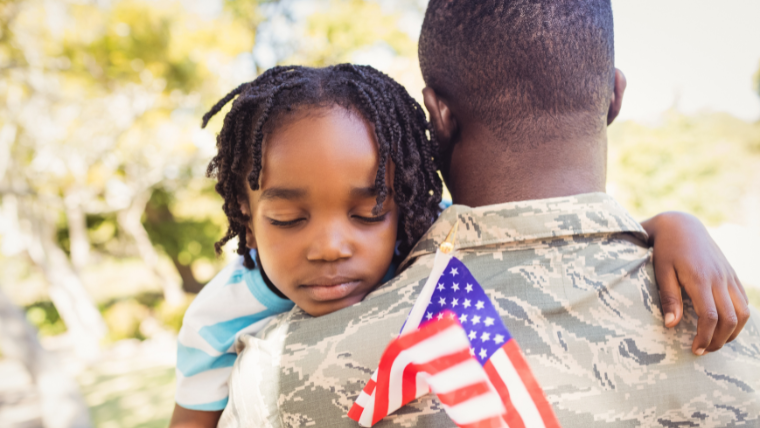In the summer of 2017, Iraq veteran Brian Easley was suffering from severe Post-Traumatic Stress Disorder (PTSD). Feeling frustrated with not receiving a disability check from Veteran’s Affairs, Easley walked into an Atlanta Wells Fargo, called a local news station, and said he had a bomb. Easley did not harm any hostages but was shot and killed by the police during the incident. Five years later, his story was featured in the movie Breaking, bringing to light the need for greater mental health services for Black veterans.
Brian Easley’s Story
Brian Easley served honorably in Iraq, but returned home carrying the invisible wounds of PTSD. His struggle to reintegrate into civilian life was compounded by financial difficulties and a lack of support from Veterans Affairs. The culmination of these stressors led to the tragic incident at Wells Fargo.
On that fateful day in 2017, Easley, feeling desperate and unheard, walked into the bank and made a distress call to a local news station, claiming he had a bomb. His intention was not to harm but to draw attention to his plight. Unfortunately, the situation escalated, and Easley was fatally shot by police.
The aftermath of this incident highlighted significant gaps in mental health support for Black veterans. Similarly, Breaking sparked conversations about the urgent need to address these disparities and provide better care.
Understanding PTSD in Black Veterans
Post-Traumatic Stress Disorder (PTSD) is a mental health condition triggered by experiencing or witnessing a traumatic event. Symptoms of PTSD include flashbacks, severe anxiety, intrusive memories, social isolation, hypervigilance, nightmares, and uncontrollable thoughts about the event. PTSD can profoundly impact a person’s ability to function daily.
Historically, PTSD was known as “shell shock” or “battle fatigue syndrome,” terms used to describe the psychological effects of war on soldiers. Despite advancements in understanding and treating PTSD, Black male veterans still face significant barriers to accessing adequate mental health support.
Learn more about PTSD and available treatment options.
Mental Health Disparities Impacting Black Veterans
Mental health disparities in Black communities are well-documented. Systemic issues such as racism, economic inequalities, and lack of access to quality care play significant roles in these disparities, resulting in Black individuals being less likely to receive mental health care. Additionally, they are more likely to receive poor-quality care when they do.
These systemic barriers extend to Black veterans, who often face additional challenges due to their service. Economic instability, stigma, and lack of culturally competent care providers further worsen these issues, leaving many without the support they need.
The story of Brian Easley is a stark reminder of the challenges Black veterans face. His tragic end underscores the urgent need for systemic changes to ensure that Black veterans receive the mental health care they deserve.
Cultural Competency in Mental Health Care
Cultural competency in mental health care is crucial for effectively addressing the needs of diverse populations. It involves understanding and respecting cultural differences and tailoring care to meet individuals’ unique needs. Implementing culturally competent practices can make a significant difference in treatment outcomes. It fosters trust, enhances communication, and ensures that care is respectful and responsive to the cultural context of each patient.
Reducing Stigma and Encouraging Treatment for Black Veterans
The stigma surrounding mental health issues is a major barrier to seeking treatment, especially in Black communities. Cultural perceptions of mental illness often discourage individuals from acknowledging their struggles and seeking help.
To reduce stigma, it is essential to promote open conversations about mental health and educate communities about the importance of treatment. Community outreach programs and public awareness campaigns can play a pivotal role in changing perceptions and encouraging individuals to seek the help they need.
Available PTSD Treatments for Black Veterans
Therapy Options
Therapy is a cornerstone of PTSD treatment, offering various approaches such as Cognitive Behavioral Therapy (CBT) and Eye Movement Desensitization and Reprocessing (EMDR). These therapies help patients process trauma, develop coping strategies, and reduce PTSD symptoms. With the right therapeutic approach, many veterans can find significant relief from their symptoms and improve their quality of life.
Medication
Medication can be an effective part of PTSD treatment, helping to manage symptoms such as anxiety and depression. It is often used together with therapy to provide comprehensive care for veterans. Proper medication management can make a significant difference in stabilizing mood and enhancing the overall effectiveness of treatment.
Support Groups
Support groups provide a platform for veterans to share their experiences and support each other. These groups foster a sense of community and understanding, which is crucial for healing. Engaging in a support group can reduce feelings of isolation and provide practical advice and encouragement from peers.
Ketamine Infusion Therapy
Ketamine infusion therapy is an emerging treatment for PTSD that has shown promising results. It involves administering low doses of ketamine to rapidly reduce symptoms of depression and PTSD, offering hope for veterans who have not responded to other treatments. This innovative therapy can provide rapid relief, which is especially beneficial for those in severe distress.
Discover how Ketamine Infusion Therapy is helping patients with PTSD.
How Mindful Health Solutions Can Help
At Mindful Health Solutions, we offer a range of mental health services tailored to meet the needs of veterans. Our team of experienced professionals is dedicated to providing compassionate, culturally competent care to help veterans manage PTSD and other mental health conditions.
We offer various treatment options, including medication management and innovative treatments like ketamine infusion therapy. If you or a loved one is struggling with PTSD, we want to help. Contact us at (844) 867-8444 to get support today.
Brian Easley’s story is a powerful reminder of the urgent need for comprehensive mental health care for Black veterans. By addressing mental health disparities, promoting cultural competency, and reducing stigma, we can make a significant difference in the lives of those who have served. If you or someone you know needs help, please call us at (844) 867-8444.

